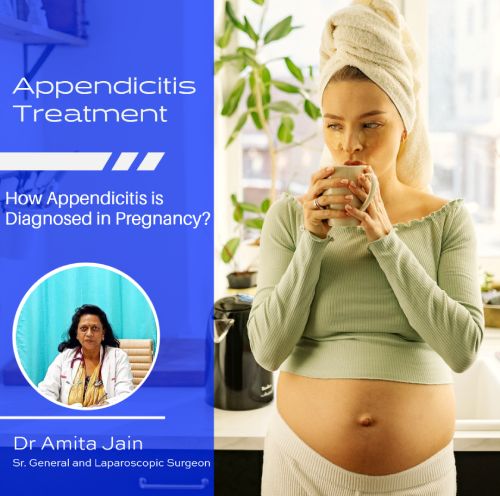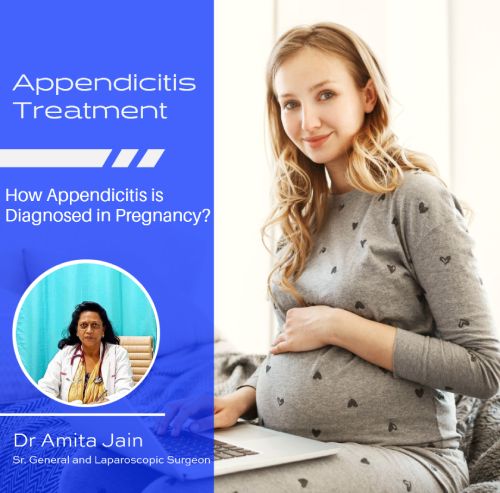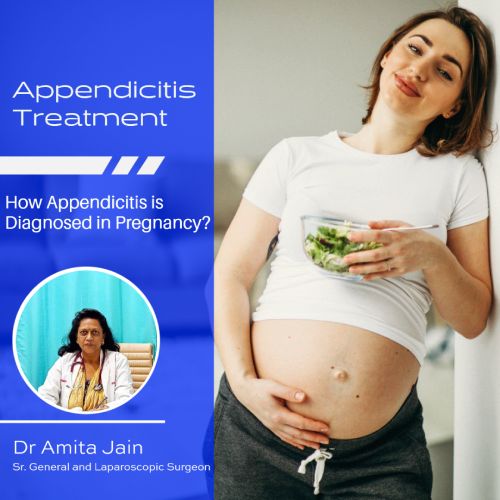Pregnancy is an extraordinary journey filled with anticipation, joy, and countless emotions. However, within this miraculous experience lies the potential for unforeseen complications. One such dilemma is the diagnosis of appendicitis during pregnancy. Appendicitis, the inflammation of the appendix, can be a puzzling condition to identify in expectant mothers due to overlapping symptoms.
In this blog, Dr Amita Jain, the top appendix surgeon in Delhi in the field of laparoscopic surgery cites the importance of promptly diagnosing and treating appendicitis during pregnancy and explores the methods used to achieve this crucial task.

Appendicitis during pregnancy
Appendicitis is a medical condition in which the appendix (a small tube-like organ attached to the large intestine) becomes inflamed or infected. Appendicitis in pregnancy often remains unnoticed, yet it is one of the most prevalent non-obstetric surgical conditions during pregnancy. Identifying this condition becomes exceedingly challenging due to common symptoms associated with normal pregnancy.
Symptoms
- Abdominal pain: The most common symptom of appendicitis is abdominal pain, typically starting around the belly button and then shifting to the lower right side of the abdomen. During pregnancy, the appendix may shift upward which causes pain in the right upper quadrant or right flank region.
- Nausea and vomiting: Many pregnant women experience nausea and vomiting as a normal part of pregnancy. However, if these symptoms are accompanied by severe abdominal pain, it could be a sign of appendicitis.
- Loss of appetite: Pregnant women with appendicitis may experience a loss of appetite and a general feeling of being unwell.
- Increased sensitivity to touch: The abdomen may become tender and painful to touch.
- Low-grade fever: A mild fever may be present in some cases of appendicitis.
- Changes in bowel movements: Appendicitis can cause changes in bowel movements, such as diarrhoea or constipation.
Appendicitis is more common in the first two trimesters of pregnancy. Delayed treatment can result in a ruptured appendix, leading to peritonitis (an infection in the abdominal cavity). These severe complications raise the risk of preterm delivery and fetal loss.
Diagnosis
- Gathering a detailed medical history to distinguish signs and symptoms that may be related to other potential conditions.
- Conducting a comprehensive physical examination, including an assessment of the abdomen to detect any abnormalities or tenderness. The expertise of specialized medical professionals is crucial in identifying any issues with the appendix.
- Performing blood tests, specifically a complete blood count (CBC), to assess the white blood cell count. An elevated level may indicate an infection; however, it is important to note that pregnant women often have naturally higher-than-normal WBC levels.
- Conducting a urine test (urinalysis) to identify the presence of red blood cells and white blood cells, which are commonly associated with urinary tract infections.
- Routine imaging for pregnant individuals with appendicitis symptoms is crucial for accurate diagnosis. Abdominal ultrasounds are commonly used due to their safety and accessibility, providing insights into both the baby’s health and potential causes of pain. If inconclusive, MRI can offer detailed images without radiation exposure.
Once the diagnosis is confirmed, treatment for appendicitis in pregnancy prioritizes minimizing harm to the fetus, following similar principles as in non-pregnant individuals.

Treatment
Appendectomy remains the gold standard for treating appendicitis during pregnancy, as a ruptured appendix can lead to sepsis. Open surgery or laparoscopic appendectomy are options based on severity and expertise. Laparoscopic appendectomy is recommended due to safety, accurate identification, and abdominal assessment. Cesarean section is usually unnecessary but depends on complications and the patient’s health.
Laparoscopic appendectomy is the preferred method due to smaller incisions, reduced blood loss, less pain, scarring, and faster recovery. Advanced 3D laparoscopic surgery utilizes high-definition lenses, 3D glasses, and a 4K Ultra High Definition instrument. Surgeons can visualize the surgical field with enhanced accuracy and safety on a large surgical monitor screen.
However, the complexity of the procedure depends on the appendix’s position and complications. Optimal outcomes require both advanced technology and skilled surgeons with a multidisciplinary approach.
The diagnosis of appendicitis during pregnancy is an intricate challenge that demands attention and expertise. Timely identification and treatment of this condition are vital to ensure the well-being of both the mother and the growing baby.

Dr Amita Jain is a surgeon with highest degree of professional competence, precision and surgical craftsmanship. Performed all complicated general surgery procedures with in depth knowledge of invasive and few minimal invasive and onco surgical techniques. Underwent special training in trauma, executed various trauma-related complex life-saving neurosurgical procedures, reconstructed injured mangled limbs and performed vascular and reconstructive procedures with critical care.
Dr Amita Jain holds 28 plus years of rich experience in Trauma and General Laparoscopic Surgeries (including Gallbladder stone removal, appendix removal, hernia repair surgery, piles and fissure surgeries). She was the Professor Surgery of at the Army College of Medical Sciences and Base Hospital Delhi Cantt. In 1994 she was commissioned as Surgeon under the United Nations Mission in Congo. From 2020 to 2022, she worked with Bansals Hospital. Currently, Dr Amita Jain is the Senior Consultant, (Speciality: General and Laparoscopic Surgeon) at Artemis Lite Hospital, New Delhi
